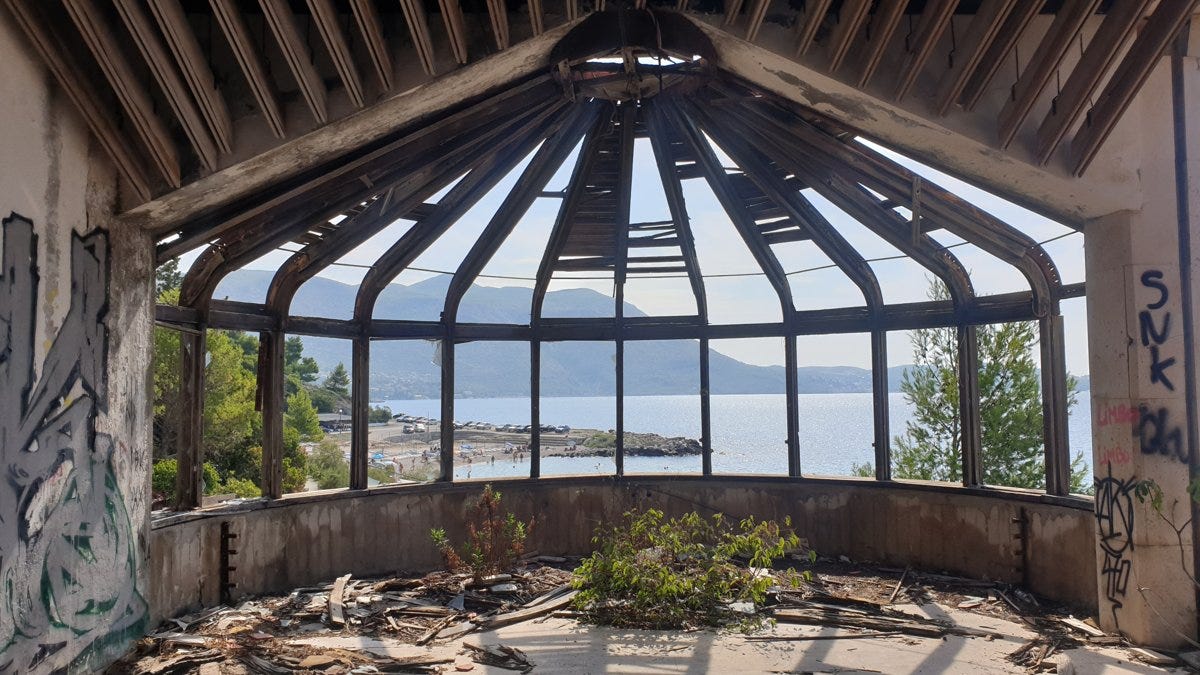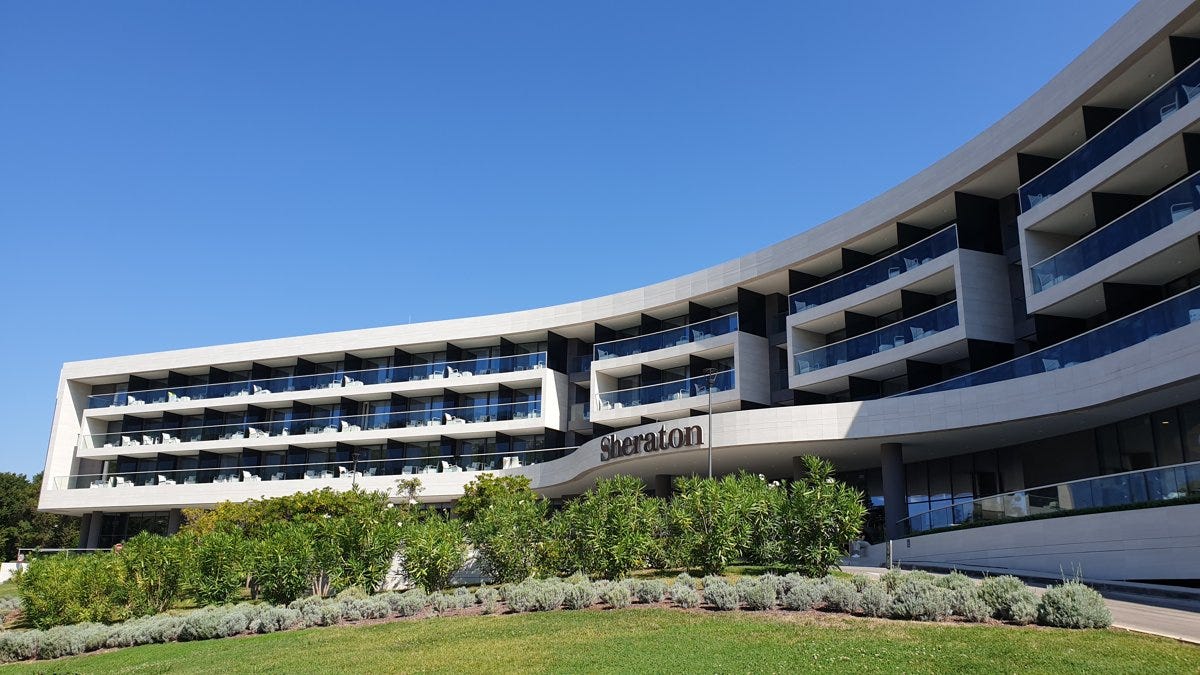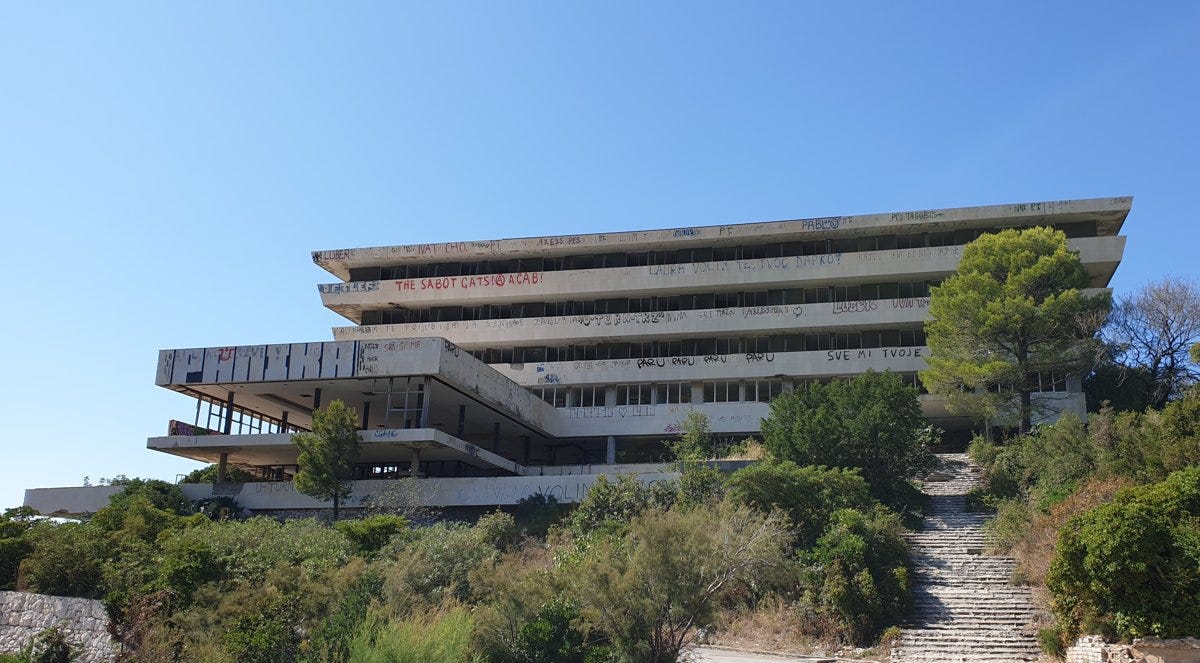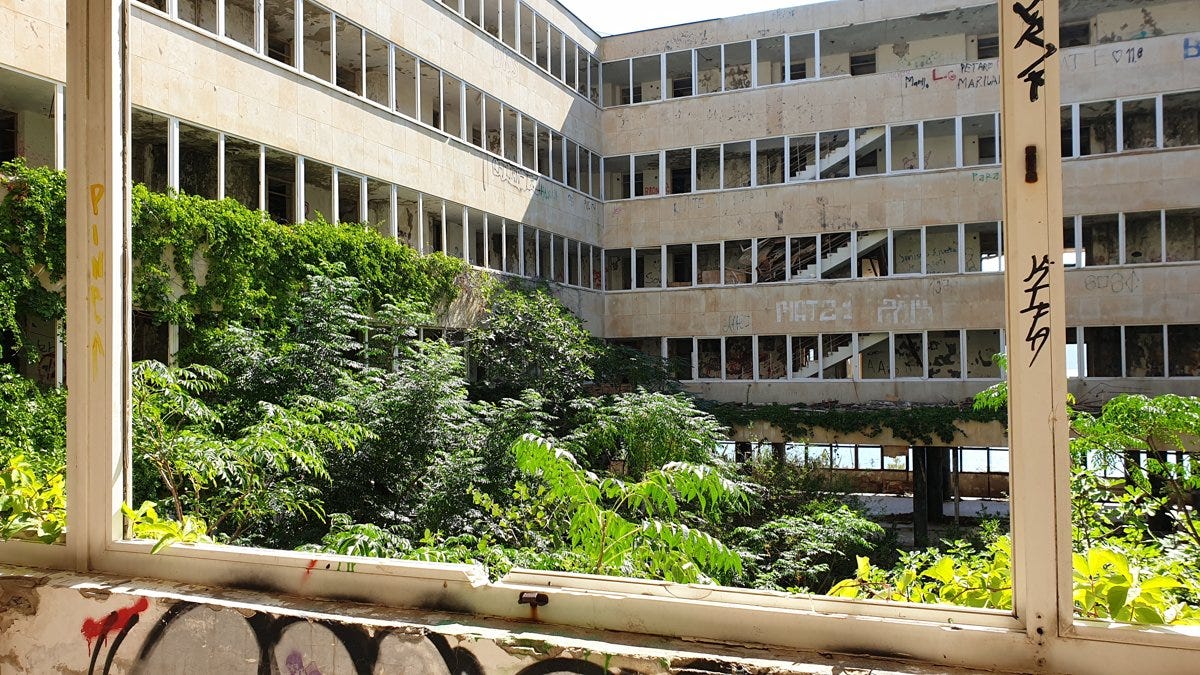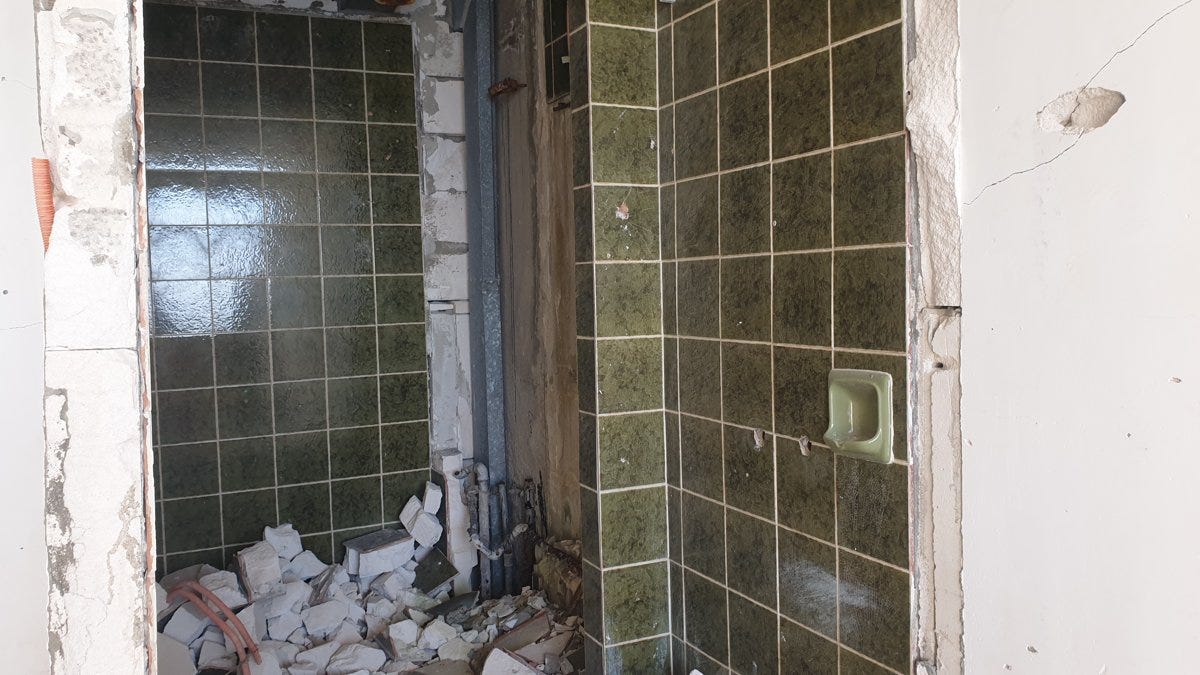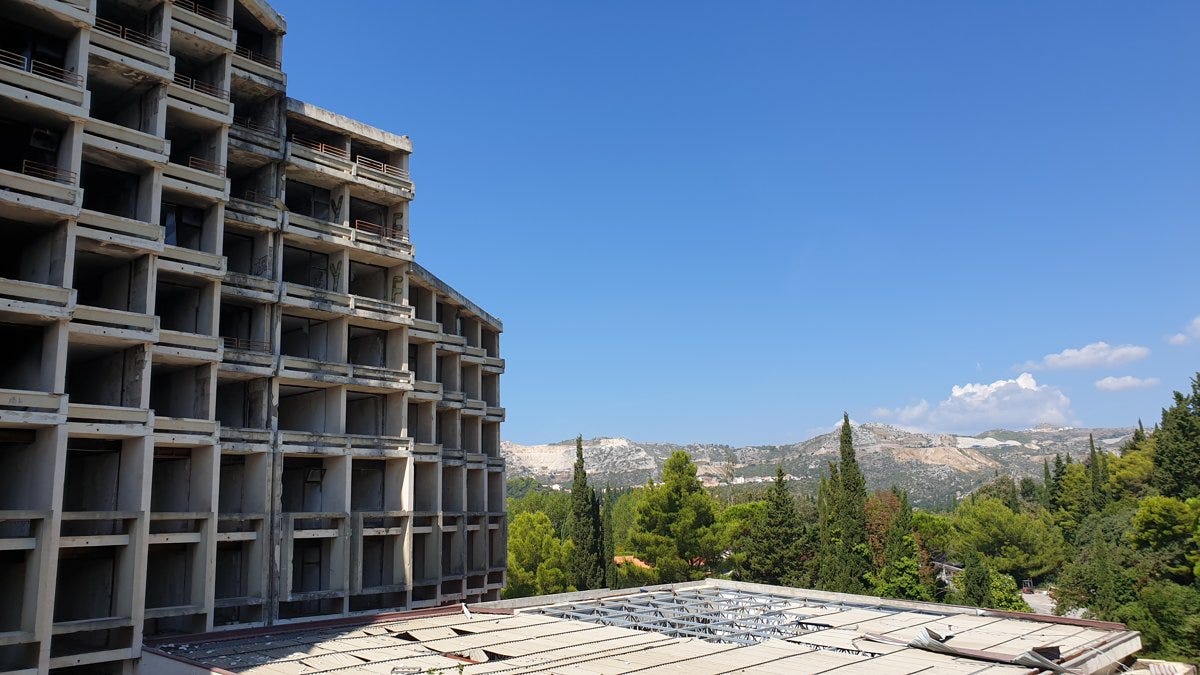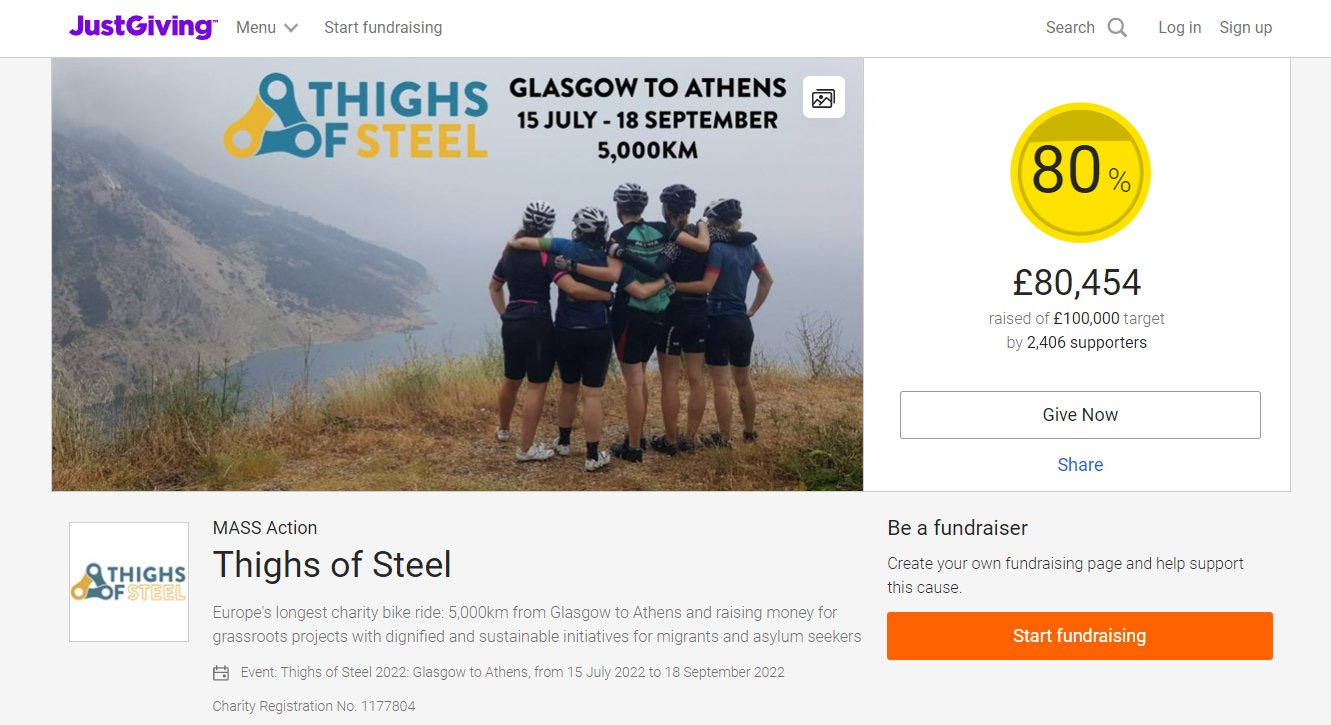Room Service & The End Of The End Of History
After two millennia, a collapsed way of life feels humbling, but safe — like sitting on the edge of a high cliff at moonless midnight, looking over the ocean at the dance of the Milky Way.
Happy Friday - And What Did You Have For Breakfast?
In Italy, instead of making small talk about the weather, denizens prefer gastronomic tittle-tattle: ‘What did you cook last night?’, ‘What did you have for breakfast?’, ‘Terrible year for aubergines — but how about dem courgettes, eh?’
Strangely, the breakfast question is most used by recording studio wonks to test microphone levels. But forget that: I declare that the diet of all Britishers would immediately improve by six percentage points were the Italian approach to small talk be adopted nationally.
Think of the humiliation if, instead of passing comment on cumulonimbus, you had to confess that, yes, again, you had spaghetti hoops and hummus for breakfast. There’s only so often you could return to the well of dietary deceit.
Think too of the virtuous cycle of recipe exchange, the social flywheel of surprise dinner invitations and the nutritional camshaft of actually noticing the changing flavour of the seasons!
Starting today, please, people.
Welcome to edition 333.
👋 My name is David and I’m a writer, outdoor instructor and cyclist-at-large with Thighs of Steel. I write stories that help you and me understand the world (and ourselves) a little better.
Today, I am writing from Dubrovnik, another UNESCO World Heritage Site (4.17 stars), home of both the world’s oldest arboretum and its oldest operational pharmacy, as well as countless palaces and cathedrals and two kilometres of medieval fortifications that have since made the city so famous for its screen roles in Game Of Thrones and Star Wars.
But, in the words of The Tim Traveller, we’re not here to see any of that.
We’re here for…
Room Service & The End Of The End Of History
I have a feeling that this story is going to be a difficult one to write.
Not because I’m way out of my depth — I’m used to that feeling — but because, no matter how much I pull on the thread, I can’t seem to find the end.
Writing this introduction, I look down at my hands and only see a tangled mess of what was once useful material.
But here goes. Let’s start at the beginning.
As a lapsed archaeologist, I’ve written before about the humbling effect of ancient ruins, in this case, at Sbeitla in Tunisia:
An entire ruined city leaves behind a cemetery of civilisation. It reminds us that, not only will our individual lives decay and be forgotten, but our entire way of living will also decay and be forgotten.
At the distance of two millennia, a collapsed way of life feels safe. Humbling, but safe — like sitting on the edge of a high cliff at moonless midnight, looking over the ocean at the dance of the Milky Way.
But on the coast of what I might as well call Dalmatia, in what is now the south of Croatia, a collapsed way of life stands only a short way off.
The gravestones are fresh, the dates comfortably inside my own living memory. The cemetery has not had time to decay into the aesthetics of ancient archaeology.
The ruins come with bed springs, soap dishes, smashed glass and room service.
Two Luxury Beach Resorts, Two Socioeconomic Systems
I’m staying in an unsmashed studio apartment in Župa Dubrovačka, the Dubrovnik Riviera, overlooking a string of beaches that, over the past couple of millennia, have seen the comings and goings of Greeks, Illyrians, Romans, Byzantines, Avars, Slavs, Ragusans, Ottomans, French, Habsburgs, British, Italians and Germans.
What can I say? This coastline has always been a popular place for marauding tourists. And, from the glittering array of exotic numberplates lined up in the seafront car parks, I’d say it still is.
Which is nice because today’s story is the tale of two luxury beach resorts.
This is the Sheraton Dubrovnik Riviera, a 239-room complex nestled around Srebreno Bay that includes swimming pools, tennis courts, a piano bar (without a piano) and no fewer than 1500m² of conference facilities.
Fun fact: Sheraton hotels are owned by Marriott International, the world’s biggest hospitality chain, whose 1.4 million bedrooms could happily accommodate the entire urban population of Buenos Aires, Chicago or Paris.
It’s fair to say that, despite the downturn in fortunes over the pandemic, Marriott are doing okay. Otherwise they probably wouldn’t waste so much water sluicing down their restaurant decking with a power hose every morning.
An enduring triumph of twentieth century American capitalism.
But a five minute walk around the headland brings me to Kupari Bay and luxury beach resort number two…
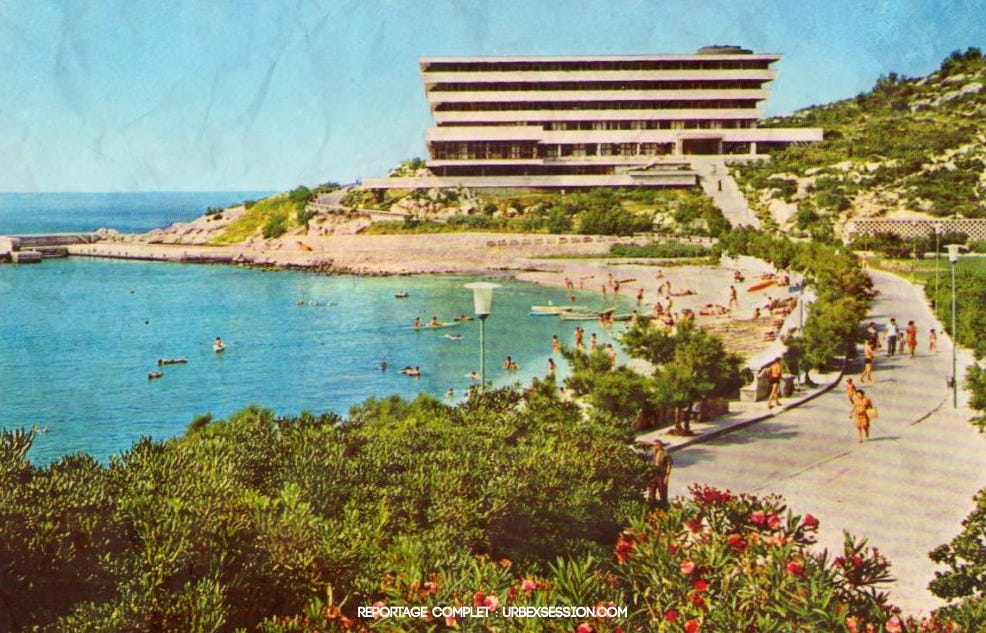
Five minutes forward, five decades back, welcome to the Hotel Pelegrin, part of a five-hotel beach resort that, in its pomp, could accommodate 1,600 guests around the warm waters of Kupari Bay.
Stroll along the beachfront promenade and you’ll find a boutique hotel, two celebrity villas and ‘an underground structure called Potkop, once exclusively used by high government officials’.
A triumph of twentieth century Yugoslavian market-based socialism.
But if we come closer, in time and space, today the Hotel Pelegrin looks more like this:
Even The President-For-Life Loves To Sunbathe
Climbing that crumbling staircase reminds me of the sheer face of a time worn Pharaonic pyramid — yet it can be scarcely fifty years old.
Say what you want about Communist-era building materials, but nature’s decay was certainly accelerated by vengeful military vandals.
Despite the shattered glass, exposed brickwork and stripped light fittings, it’s not hard to reconstruct a stay at the Pelegrin.
You pull up to the concrete entrance way, step out onto the terrace for sundown lounging, greet other guests as you pass on the thinly carpeted corridors.
Fill the closet, test the bed springs, piss in the avocado colour-matched bathroom.
Something about seeing another civilisation’s soap dishes really brings it home: we’re not here forever.
A waterfront pedestrian footpath, the rocky shore coated in the poured concrete so beloved of mid-twentieth century architects, leads you past Hotel Pelegrin to Comrade Tito’s private villa.
I wonder if Yugoslavian President-For-Life Josip Broz Tito, sunbathing at his private Kupari villa, ever pondered his own evanescence?
Sadly, the the path abruptly ends in an all too modern military guardhouse.
Idly, I look up the Kupari complex on Google: 4.6 stars from 179 reviews. The Sheraton Dubrovnik Riviera, pleasingly, scores no better and some of its guests sound like they should’ve stayed at the Pelegin:
Poor diner, poor food in general, piano bar without piano 🙄🤣. Diner area looks like an airport terminal. Everything looks just boring, no cosyness at all. Restaurants at the beach have the same boring vibe as the hotel in general.
There’s nothing boring about picking crushed glass out of your flipflops.
As I crunch around the enormous complex, I reflect on the gargantuan effort that went into building this thing.
And this thing is only one small corner of a civilisation that covered six republics — not only Croatia, but Bosnia and Herzegovina, Macedonia, Montenegro, Serbia and Slovenia too.
So what happened?
How come Srebreno Bay boasts the thriving Sheraton, busy with satellite restaurants, beach bars and umbrella entrepreneurs, while, five minutes up the coast, Kupari Bay is a ghost resort, riddled with actual bullet holes?
It would be all too easy to take these parallel beaches with their parallel histories and point to the parallel socioeconomic civilisations that built them.
Such finger pointing, however, would be a huge mistake…
~
…but it’s a huge mistake we’ll make next Friday — sorry!
I wanted to cram the whole story into this week, but Substack tells me this piece is way too long for your inboxes so I’m splitting it into two.
Besides: next week I’ll be far too busy cycling through the rest of the former Socialist Federal Republic of Yugoslavia to write anything.
The second part of this story will have to keep you going until Thighs of Steel finally reach Athens. Talking of which…
This is the last time we’ll increase our fundraising target. £100,000. Six figures. Are you with us?
100 Days of Adventure 2022
🟢🟢🟢🟢🟢🟢🟢🟢🟢🟢🟢🟢🟢🟢🟢🟢🟢🟢🟢🟢🟢🟢🟢🟢🟢🟢🟢🟢🟢🟢🟢🟢🟢🟢🟢🟢🟢🟢🟢🟢🟢🟢🟢🟢🟢🟢🟢🟢🟢🟢🟢🟢🟢🟢🟢🟢🟢🟢🟢🟢🟢🟢🟢🟢🟢🟢🟢🟢🟢🟢🟢🟢🟢🟢🟢🟢🟢🟢🟢🟢🟢🟢🟢🟢🟢🟢🟢🟢🟢🟢🟢🟢🟢⚪⚪⚪⚪⚪⚪⚪
Free But Not Cheap
That’s it for this week — thank you for reading all the way through.
Any comments, questions, insults to hurl my way? You can reply to this email like any other. My favourite correspondent last week described me as a ‘perverse horn-blowing imp of the ridiculous’.
This newsletter is supported, Patreon-style, by people who click the soothing purple-ish-blue buttons below. £30 per year gives me the means and motivation to keep on writing this little thing. Thank you 🙏
Three Small Things At The End
[PODCAST] As someone who is highly suggestible and often accused of being a hypochondriac, I feel some kinship with David Robson, author and reader of The Expectation Effect, a book about how our minds set our performance boundaries. However, I feel at odds with Robson’s (or his marketing team’s) focus on using the ‘remarkable science’ of expectation to make ourselves ‘faster, stronger, fitter’. I’m sure it’s all in merrie good faith, but I’m suspicious of slick shortcuts…
[MEDITATION] Whatever you think of his lifestyle, podcaster and author Tim Ferriss has interviewed a heck of a lot of high achievers and was prompted to change his own life when he realised that almost all of them had one habit in common: they meditated, daily. I’m gutted that I missed Ben’s 4-week online meditation course (it began yesterday), but recommend his daily micro newsletter so maybe you can catch him next time.
[JOURNO] Keep an eye on Alex King. He’s doing interesting things.
That’s it for this week. Stay tuned for the second part of Room Service & The End Of The End Of History next Friday…
Big love,
dc:


